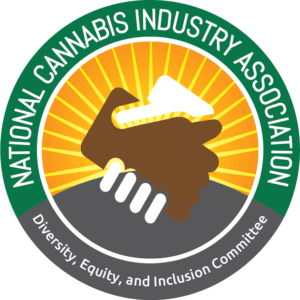 by Mark Slaugh, iComply LLC
by Mark Slaugh, iComply LLC
NCIA’s Diversity, Equity, and Inclusion Committee
As the debate heats up on “how” rather than “if” cannabis legalization will happen, social equity and comprehensive reform are at the forefront of the minds of national legislators and advocates. Previously, in part 1 of this series, the DEIC examined the problems inherent in existing social equity programs and the merit of federal social equity in regulating interstate commerce. Sadly, as written currently, all proposed federal bills fail to meet the critical objective of creating as much NEW generational wealth as possible for those harmed by the war on drugs. Now, we examine the key components of a proposed framework to address these challenges, how to define social equity federally, and the merit of determining the types and numbers of permits to be issued.
Key Considerations for a Federal Cannabis Social Equity Program:
Fundamentally, any federal act for cannabis legalization should be a social justice bill that deschedules cannabis federally and that creates the most amount of new generational wealth for those most impacted by prohibition. Expungement for all persons with a past criminal record involving cannabis is the bare minimum these bills should do. However, proposed bills so far fall short of the latest innovative solutions to known problems in social equity programs and should be amended to include these key considerations.
Any proposed act must be amended to include provisions on regulating interstate commerce immediately after descheduling. The NCIA’s Diversity Equity and Inclusion Committee (DEIC) believes any federal act must prioritize social equity ownership of interstate commerce permits issued by the federal government. Learning from the municipal and state social equity programs, this policy paper seeks to propose amendments that meet these objectives, by instituting the following amendments to federal legalization bills:
-
Defining the regulatory agency for federal interstate commerce regulation and taxation
- Alcohol and Tobacco Tax and Trade Bureau (TTB) and U.S. Small Business Administration (SBA) roles and responsibilities
- Defining number and types of seats for a Federal Cannabis Social Equity advisory board
- Ensure a diverse and representative Federal Cannabis Social Equity advisory board members, e.g., federal, state, tribal nations, diverse city representation, NCIA, and social equity cannabis owners, and operators.
-
Defining who qualifies as a social equity interstate commerce permit holder:
- Outlining what states must meet as a minimum standard set by the federal government to participate with equivalent/reciprocal qualification.
- May be determined by advisory board to define social equity qualifications
- With minimum areas defined such as: income, arrest history, disproportionately impacted area(s), residency or heritage to avoid gentrification issues at large.
-
Defining permit types (similar to wine wholesale model) such as:
- Importing
- Privileges to buy from exporters directly and sell to distributors or transporters and licensees into a state system from another state
- Importing
-
- Exporting
- Privileges to buy from operators and sell from a state system to an importer in another state
- Exporting
-
- Transporting
- Privileges to sell to or buy from qualified cannabis licensed businesses within a state system and to move product from or to licensees in a state or between importers and exporters interstate
- Transporting
-
- Testing
- State labs that meet national standards to ensure consistency with results for other permit types
- May not be strictly social equity since existing labs are more specialized in converting to federal standards and adding this permit
- Testing
Defining these basic requirements offers a framework for interstate commerce permitting and establishes the essential agencies required to enact a robust social equity program federally. More importantly, it stalls illegal and gray area activity from taking root under the guise of federal legalization by ensuring interstate commerce activity falls under a specific regulatory agency already well versed in interstate commerce permitting and regulation.
Suggested Social Equity Definition:
To define social equity applicant qualifications, DEIC suggests the TTB and SBA move away from diversity supplier program definitions which are too restrictive for a new industry to qualify. In order to accommodate the cannabis industry, DEIC recommends looking at other state definitions of social equity qualification that have proven to be effective.
- Factors like living in a disproportionately impacted area for 5 out of 10 years, being arrested for cannabis or having a family member who was arrested, as well as income below the poverty line, should become qualifying factors.
- Additionally, minorities, women, and veterans should be given additional consideration in the definition of who qualifies as a minority cannabis business.
- High poverty rate, unemployment rate and participation in federal or state income-based programs, a history of arrests, convictions and other law enforcement practices in a certain geographic area, such as, but not limited to, precincts, zip codes, neighborhoods, census tracts and political subdivisions, reflecting a disparate enforcement of cannabis prohibition during a certain time period (war on drugs started in 1971), when compared to the rest of the state.
- Utilize the advisory committee and collaborate with cannabis social equity groups to make sure gentrification and displacement are taken into account. Many areas have drastically changed over the last 5-10 years. Where a person spent their formative, childhood years should also be factored in. Guarding against ‘gerrymandering’ types of map cutouts, where folks who grew up literally surrounded by DIA’s, and who dealt with many of the same issues growing up, are somehow not considered to be disproportionately impacted.
We believe the federal government should leave regulations within each state alone during this multi-year implementation and defer to the TTB and SBA to work in conjunction with any Federal Drug Administration (FDA) regulations with their primary focus pertaining to interstate commerce and taxation as it relates to social equity permit issuance.
Defining How Many Permits to Issue to Social Equity Operators
To address the common shortfalls of state programs, the DEIC realizes that social equity applicants are already a minority stakeholder in existing cannabis licensing. In most states, sadly, constituting less than 5% ownership. This is a huge difference compared to the proportion of individuals in prison for the same activities a licensed business is allowed to conduct.
-
Accordingly, the DEIC recommends a direct balance in ensuring a lock-out period on issuing new permits and ensuring, during that time, that 95% of the permits go to social equity owners/operators.
While some may consider such a counter-balance to be extreme, more and more states are increasing the committed amount of licenses for social equity to ensure a fair counter-balance. If anything, mega-players should be competing with each other for a select number of limited licenses – not the other way around.
We also realize that, in order to generate investment or value behind interstate commerce permits, there could not be an unlimited number of them initially issued. While the advisory board may issue more in the future, we feel a bold stand to increase the number of valuable permits for initial social equity applicants nationwide is necessary to ensure a balance that reflects the oversight to include social equity business into the industry thus far.
- DEIC suggests 1,500 permits as a starting point divided among the three primary types (import, export, transport) as a fair balance initially.
The above policies may seem bold, but they are designed to seek to balance the industry and state’s failure to allow social equity participation. Most cannabis states left out social equity operators by mandating residency and felony-free requirements.
The reality is that interstate commerce means selling the products already owned and produced by non-social equity folks. Further, if it was not for these legacy operators, there would not be a cannabis culture. A culture that has been co-opted from legacy social equity operators by mega operators who kept “undesirables” from the industry at its inception.
These policies seek to balance the needs of traditional cannabis businesses that would most benefit from interstate commerce, with the needs of social equity businesses to create equal opportunity. By limiting the number and availability of interstate commerce permits for at least a 5 lock-out year period, the policy ensures traditional operators partner with social equity permit holders to export, import, and transport their goods between various markets.
The policy helps ensure partnerships that are more equitable for both parties and, in doing so, seeks to avoid “predatory operating agreements” or “social equity colonialism” that dilute social equity operators who are not given the opportunity or resources to bring anything to the table. Therefore, the DEIC stands by lock-out periods and a dedicated high percentage of limited licenses for social equity interstate commerce permitting as a policy to balance existing inequity.
In the next part of this policy paper series, the DEIC will examine how this framework sets up social equity technical assistance, qualification, and a phased approach of implementation to ensure the widest net is cast and that social equity operators have ample time to qualify, are appropriately funded, and set up for success with an equal starting line for interstate commerce.


Follow NCIA
Newsletter
Facebook
Twitter
LinkedIn
Instagram
–